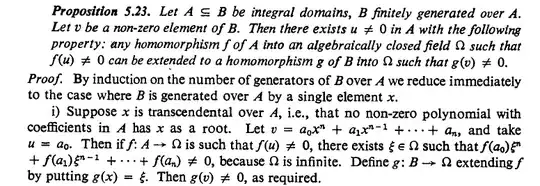I have a question about the following proof in Atiyah-Macdonald:

1:Why is $\Omega$ infinite? Are all algebraically closed fields infinite?
2: How does the existence of $\xi$ follow from $\Omega$ being infinite?
Thanks.
I have a question about the following proof in Atiyah-Macdonald:

1:Why is $\Omega$ infinite? Are all algebraically closed fields infinite?
2: How does the existence of $\xi$ follow from $\Omega$ being infinite?
Thanks.
1.) Yes, algebraically closed fields are infinite: For, if $\mathbb F$ is a finite field, we can consider the polynomial $p(X) = 1 + \prod_{a \in \mathbb F}(X-a)$, which has no zeros as $p(\alpha) = 1 + 0 = 1$ for each $\alpha \in \mathbb F$, so $\mathbb F$ is not algebraically closed.
2.) $\xi$ is choosed such that $\xi$ is not a zero of $q(X) = \sum_{i=0}^n f(a_i)X^{n-i}$, as $f(a_0) \ne 0$, $q$ has degree $n$ and hence at most $n$ different zeros. As $\Omega$ has, by 1.), infinitely many elements, there is a $\xi \in \Omega$ with $0 \ne q(\xi) = \sum_{i=0}^n f(a_i)\xi^{n-i}$.
Hint $\rm\,(1)$ follows by a polynomial analog of Euclid's proof of infinitely many primes. If $\rm\:D\:$ is a domain, then Euclid's method yields infinitely many nonassociate irreducible polynomials $\rm\in D[x].\,$ When $\rm\,D\,$ is an algebraically closed field, irreducibles are linear, associate to a monic prime $\rm\:x-a.\:$ Thus infinitely many nonassociate primes $\rm\:x-a_i$ $\Rightarrow\,$ infinitely many $\rm\:a_i$ $\Rightarrow$ $\rm\:D$ infinite.
For (2) recall a ring $\rm\,D\,$ is a domain iff every polynomial $\rm\,f\ne 0\,$ over $\rm\,D\,$ has at most $\rm\,deg\ f\,$ roots.